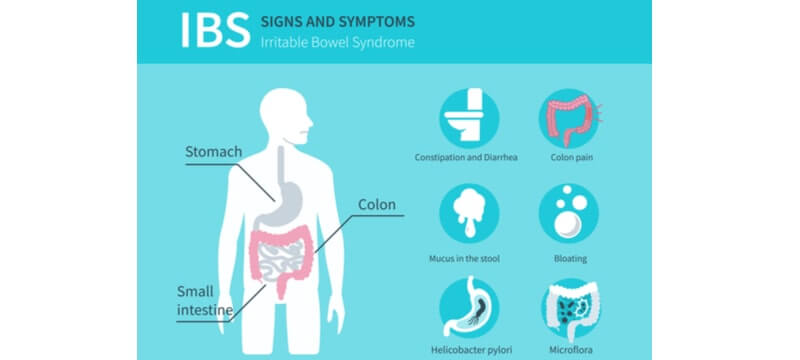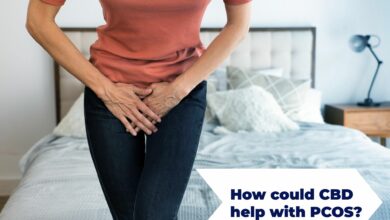
Irritable Bowel Syndrome (IBS), the common yet mysterious gastrointestinal disorder might be related to an endocannabinoid deficiency; could CBD oil for IBS be the answer? We investigate the research to find out just how credible these claims are.
Table of Contents
CBD for IBS: What is IBS?
It is broadly estimated that the prevalence of IBS in the UK population is 17% overall.
- Approximately 11% among men
- Approximately 23% among women
Irritable bowel syndrome (IBS) is a medical disorder that causes stomach pain, slowed gastrointestinal motility, and digestive distress. Even though the medical profession has yet to pinpoint the exact source of IBS symptoms, a recent study suggests two possible causes. Clinical Endocannabinoid Deficiency(CED), according to a recent study, might possibly be the cause of IBS and Inflammatory Bowel Disease (IBD).
Chronic inflammation and IBS symptoms arise when the body is unable to manufacture endogenous cannabinoids like 2-AG or Anandamide, according to this groundbreaking research. Other research points to bacterial overgrowth of the small intestine (SIBO) as a possible cause of IBS and other digestive health issues.
When there is a deficiency of endocannabinoids or a bacterial or parasite infection, the body's inflammatory response is heightened in both circumstances (possibly created by a lack of endocannabinoid signalling).
IBS is connected to chronic stress, gut flora abnormalities, and inadequate digestive enzymes in the digestive tract, according to most researchers. Chronic stress and gut bacteria are most likely to blame for IBS. However, there could be a deeper link to the endocannabinoid system (ECS).
When the body does not produce enough endogenous cannabinoids like anandamide and 2-AG, it is unable to moderate stress levels. The inability to synthesise the required amount of endocannabinoids may be the cause of IBS symptoms. To restore things to normal, your GI tract may be signalling you that you need more rest, appropriate nourishment, and stress-relieving activities.
Does CBD help with IBS?
CBD (cannabidiol) is a phytocannabinoid chemical generated from cannabis that has shown to be an effective treatment for IBS. Although there is no conclusive evidence that CBD can cure IBS, researchers have discovered that after taking CBD to assist alleviate the symptoms of IBS, study participants reported less abdominal pain, less gastrointestinal inflammation, and less frequent constipation and cramps.
CBD not only relieves stomach pain, gastrointestinal inflammation, and constipation, but it may also modify the gut microbiome, according to new research. While the research is still in its early stages, preliminary findings suggest that CBD could be used not just to treat IBS symptoms, but also to help cure IBS symptoms over time and return the microbiota to a healthy function and makeup.
Here's a rundown of recent research on CBD's effects as a treatment for Irritable Bowel Syndrome. Some studies will look at how CBD and cannabinoids affect IBS symptoms and inflammation, while other studies will look at how CBD and cannabinoids affect the microbiota:
In 2004, researchers discovered that the ECS possessed a potent pain-blocking mechanism capable of reducing pain in IBS patients:
The effects of CBD on the immune system's inflammatory response mechanism were investigated by a group of experts from Naples. CBD can prevent intestinal damage by lowering the inflammatory response, according to researchers. CBD helps to limit the harm produced by the body's immune system as it tries to protect itself from the consequences of irritable bowel syndrome and leaky gut by controlling the inflammatory response.
The researchers looked at 30 people who had been diagnosed with Crohn's disease. After therapy with cannabis, all 30 patients reported an improvement in their general well-being, and 22 patients reduced their use of corticosteroids.
A group of Belgian researchers discovered that by modifying the gut microbiota of obese mice using prebiotics, they were able to alter ECS expression in fat tissue, which has ramifications for lipid metabolism and fat cell development. While this is an early study that was not conducted in humans, it does imply that microbiota and the Endocannabinoid System are linked (ECS).
Mice on a strict high-fat diet were given a daily dose of THC by Canadian researchers. These animals' gut microbiota health improved in 3-4 weeks, like that of animals on a nutritious and balanced diet. This study demonstrates that changes in the microbiome have an impact on the ECS, this study demonstrates that the contrary is also true. Cannabinoids trigger the ECS, affecting the microbiota composition.
How to use CBD oil for IBS
Different CBD oils contain different quantities of CBD, and distinct CBD ingestion methods have different effects on your body. However, if you opt to utilise CBD for IBS, you should start with a typical dose of 10-20 milligrams taken orally once a day.
CBD doses as high as 1,500mg tincture (50mg CBD per day) have been demonstrated to be well-tolerated in human subjects in clinical research, but if you prefer to use CBD products as seldom as possible, even a modest dose may deliver the therapeutic effects you seek.
For the best effects, how should I consume CBD oil?
CBD can be taken in a variety of ways, some of which may be more useful for IBS than others:
CBD tinctures
CBD tinctures, as orally taken CBD products, provide the cannabinoid directly to your digestive tract. The CBD in your tincture, however, will be absorbed beneath your tongue along the route, potentially restricting the quantity of CBD that reaches your digestive system.
CBD capsules
CBD capsules for IBS CBD capsules pass through your oesophagus before entering your stomach, releasing CBD. As a result, capsules may carry CBD more effectively into your digestive tract than conventional consumption techniques.
CBD edibles
CBD edibles for IBS are sweet and convenient, but when you chew, a lot of the CBD is absorbed into the lining of your mouth. CBD pills might be a better option for IBS sufferers.
How does CBD oil help with IBS?
While more research is needed, we now have a better understanding of how gut health affects the body and the interplay between bacteria, the ECS, and practically all organs, including the brain, than ever before. Including how CBD oil for IBS might go a long way to helping the symptoms of the condition.
CBD not only reduces inflammation and IBS symptoms but also stimulates the ECS, which has been demonstrated to modify the microbiome makeup in mice models. The ECS acts as a link between microorganisms and the rest of the body, including the brain, passing messages back and forth in a mutually beneficial symbiotic connection. CBD and THC can work as a probiotic, boosting the natural count of the lactobacillus bacterial strain, which is typically found in over-the-counter probiotics.
Is CBD oil for IBS better with added CBG?
Another significant cannabinoid, cannabigerol (CBG), has shown promise in treating IBS symptoms and possibly addressing the fundamental cause of endocannabinoid insufficiency. Surprisingly, CBG has proven to be a potent broad-spectrum antibiotic capable of combating antibiotic-resistant superbugs like MRSA. This could be especially beneficial if you have GI issues caused by bacterial infections like SIBO.
How much CBD oil should I take for IBS?
We recommend starting with a low dose of CBD to observe how it affects you. You may notice distinct effects and a varying uptake time depending on the sort of CBD you're consuming. Below are some approximate guidelines you can follow according to your weight and the severity of your symptoms.
Consult your doctor to see whether CBD is good for you and dosage recommendations. The advice given here is not intended to diagnose or treat any ailment. CBD has a distinct effect on various people, so we recommend starting low and gradually increasing your dosage. All the while, constantly assessing its impact on you over a period of at least three to six weeks.
CBD is easily absorbed by the majority of humans. However, at larger doses, adverse symptoms such as dry mouth, decreased appetite, mild fatigue, and diarrhoea have been noted. Before using CBD, consult your doctor if you are taking any drugs. The cannabinoid is unlikely to but it has the potential to interact with other medication. Things like blood thinners and NSAIDs; it could even diminish the effects of other prescribed drugs.
| 30-72 lb | 60-114 lb | 105-150 lb | 150-190 lb | >240 lb | |
| Mild IBS | 5-12 mg | 10-19 mg | 18-25 mg | 25-32 mg | 32-40 mg |
| Moderate | 15-36 mg | 30-57 mg | 53-75 mg | 75-95 mg | 95-120 mg |
| Severe | 30-42 mg | 60-114 mg | 105-150 mg | 150-190 mg | 190-240 mg |
In summary
CBD's anti-inflammatory activity, pain alleviation, stimulation of the ECS, and impact on gut microbiota have all been reported to help people with IBS, according to research. It is particularly beneficial for those with gastrointestinal disorders such as IBS, SIBO, CD, and IBD. While the research and reviews are encouraging, everyone's body reacts differently, so you may not have the same results as other users. If your IBS symptoms are affecting your quality of life, try a natural remedy with scientific backing, such as CBD, CBG, or Beta-Caryophyllene.
So, while CBD may help relieve the symptoms of IBS, there still isn't enough evidence to say for sure. What is apparent is that all forms of CBD are non-intoxicating and astonishingly non-toxic, so there's no reason you shouldn't use CBD while trying to lose weight and make other lifestyle changes that may help you manage IBS. Anyone suffering from IBS would like to cure it naturally, and IBS sufferers have nothing to lose by trying CBD oil to treat this debilitating illness.
You may also like to read: CBD Oil for Pain- A Guide to Its Benefits & Uses





